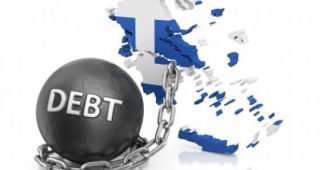State collapse occurs when states can no longer perform the functions that are required of them. [1]
By Professor William Mallinson
Athens, 26 November 2022
Introduction
This could be one of the most difficult articles that I have ever written. I am not ashamed to write it, as I deeply believe that rocking the boat and constructive criticism can be an effective way to help the beautiful country of Greece to escape from its current apathy, slavery, corruption, inertia and resignation, unlike Hungary, a country of approximately similar size, and rather less corrupt. I wish to expose and embarrass those for whom we vote, but also to expose our own hypocrisy, for having voted for leaders who care not one iota for you, their fellow countrymen, despite their tired rhetoric. There may well be no magic solution to Greece’s current problems, and thus my aim here is to awaken and embarrass, in order to find at least the least bad solution: one cannot rebuild Rome in one day.
Would Greeks be better off under a Turkish administration? This is not a rhetorical question, so read on, however indignant you may feel. I’ll say it straight out. I am dissatisfied with the Greek state. I have delayed writing this article for several months, to let my anger cool down into mere perplexity. But now I must bite the bullet: when my state pension was not awarded to me on my birthday, I assumed that it was just an administrative error. Over three and a half years later, I am still waiting with, apparently, thousands of others. Even if Greece is not known for transparency and efficiency, being one of the most corrupt countries in Europe,[2] the fact that its alleged government periodically promises and lies about how it is dealing with the pensions problem makes level-headed people increasingly cynical.[3] At the moment, Mr. Mitsotakis seems to be spending his energy on playing down a telephone bugging scandal, rather than paying pensions.
But what finally triggered me to write this article was a recent comment from a professor friend in Turkey, that ‘such things’ do not happen in Turkey, but that a cousin of his in Athens had been waiting for six years to receive his pension; hence my insulting and embarrassing question as to whether Greece would be better off under an Ottoman administration.
How can it be that instead of looking after its citizens, the Greek state, currently ‘run’ by Mitsotakis, prefers to send taxpayers’ money and old German tanks to Ukraine to kill Russians,[4] rather than pay pensions to its citizens?[5] After all, even though Britain spent billions on bombing Iraq illegally, I was paid my pension the moment it was due. This article will try to analyse the background to this bizarre phenomenon, ending with some suggestions as to how to do away with Greece’s culture of clientelism, slavery, nepotism, bribery and incompetence, of which the pensions fiasco is but the tip of a dirty iceberg.
Only History Exists
To begin to understand the background to the current abysmal state of affairs in Greece, it is necessary to understand some basic factual history. The internal difficulties that Greece faced during its fight for freedom were a bad beginning, which might have been solved had Kapodistrias not been murdered. Greece’s very own English hero, Lord Byron, summed up what he really thought when he wrote that he had come to Greece not ‘to join a faction, but a nation, and to deal with honest men, and not with speculators or peculators.’[6] Under Kapodistrias, the Greek state nevertheless got off on a good footing, but after his murder, foreign interference, mainly British, helped by Greek fifth columnists, began to dictate Greek policy, the most blatant example being that a foreign king had to be found for Greece to gain international recognition. Behind all this lay Britain’s obsession with Russia, which had of course supported Kapodistrias, who had been a Russian foreign Minister. Matters can be well summed up with the following quote by the British Minister to Greece in 1841: ‘A truly independent Greece is an absurdity. Greece can either be English or Russian, and since she cannot be Russian, it is necessary that she be English.’[7]
It was indeed mainly Britain which stifled any attempts by Greece to help Russia against the Ottomans, as the Crimean war shows, when Britain and its ally France blockaded Piraeus. It was this Russian obsession which determined Greece’s subordinate position to Britain’s imperial ambitions. It still does. The Greek civil war was due as much to Winston Churchill’s interference as to Greek squabbling. A British politician wrote at the time: ‘Instead of making Greek resistance more moderate, more democratic, more truly representative of the mass of Greek opinion, we drove it to extremes. Instead of helping to strengthen E.A.M by encouraging non-communist elements to join, we tried to weaken its influence, to prevent it ‘monopolising’ the liberation movement, by aiding its political opponents. The nationalists we tried to use were just those people with whom German propaganda against the ‘red menace’ was most effective. And Goebbels was working day and night to prove that all resistance to the Germans was communist inspired. Little wonder that so many of our ‘nationalist’ friends turned frankly quisling.’[8]
Matters remain the same today: ‘We [Britain] should also recognise that in the final analysis, Turkey must be regarded as more important to Western strategic interests than Greece and that, if risks must be run, they should be risks of further straining Greek rather than Turkish relations with the West.’[9] Britain’s Greek policy is predicated on its anti-Russian obsession, as I write. Any thinking Greek, particularly one from Cyprus, knows this. He knows that if he steps too far from the NATO line, there will be problems with Turkey, secretly aided and abetted by the Anglo-Saxons, who will only make tut-tutting noises at Turkish aggression, but do nothing in practice, as the case of Cyprus so clearly demonstrates. Thus, we can state with impunity that Greece is a collapsing state in terms of its lack of sovereignty, and that its battered population is becoming increasingly resigned, if not slavish. There is a commonly held view that a few hundred years of Ottoman occupation shaped the Greek people into what they are today. But I find this more of a simplistic excuse than a viable explanation, given that the last Ottomans were kicked out of Greece at least four generations ago. So much for some brief background. Let us turn to today.
Corruption, Nepotism, Clientelism, Inertia and Resignation
It is not easy to identify the precise causes of Greek corruption. One is clearly the fact that Greeks – especially since the mind-numbing economic measures imposed on it from 2011, followed by the harsh measures of the lockdown – in order to survive, have to avoid paying taxes even more than usual, using cash whenever possible. But it goes back further than that. A British ambassador’s comments in 1981 (today, for a historian!) provide some clues: ‘First, inefficiency and corruption. The Greek public service is bureaucratic, slow moving, and highly politicised. The administration finds it difficult to respond to the need for reform […] Though the Greeks are good at making plans, they are less good at carrying them out, and pastmasters at changing them for new plans. […] Where the administration and citizen come face to face, there is also inefficient and sometimes inhumane bureaucracy. […] The problem is partly an Ottoman bureaucratic tradition which revels in documentation and in which the petty official, not able to take responsibility for positive action, shows his power by obstructing his fellow citizens; partly the effect of the low level of education of the majority of civil servants, compounded by the propensity of all governments to put placemen into the administration (which in turn results in over-manning).[…] Much of the ‘corruption’ in Greek public life amounts in my view to little more than the working to the limits of the political system, which allows and is indeed based on the principle of rousfeti, of favours done between patron and client. This is, as anthropologists can show, deeply embedded in Greek society, and serves a social purpose so long as the administration does not provide speedy and impartial treatment to its citizens. (I am aware that there is a circular argument here that rousfeti itself prevents the development of a just state.) The local deputy persuades the Minister to find a job in a corner of his Ministry for the son of one of his clients (the Greeks say ‘one of our people’). The boy is not too bright and will not improve the efficiency of the Ministry: but the votes of the client, who is the village Headman, and of his extended family and friends, are assured. The same principle of favours exchanged applies of course to other benefits than jobs – places in hospital, even attachments to Embassies abroad. There have been grosser examples of corruption involving the highly placed, including Ministers. The handling of private sector contracts can provide examples. But I do not have the impression that this is widespread. Nor that the reputation of the government and administration has been damaged. The Greek voters seem to regard both the lesser and the greater corruption as an inevitable part of the social and political scene. With proper scepticism, they do not (except for committed and the naïve) expect PASOK to be much different. […] Accession to the European Community is certainly going to bring particular, and acute problems of adaptation in which some parts of Greek industry, unable to compete without protection, will go under. […] PASOK in power would be a force for instability and disintegration, damaging to western interests. […] Finally, where within the system lies the possibility of change and reform such as will reduce the inefficiencies and eliminate the corruption? It is hard to see. I have doubts about PASOK’s credentials to reform the administration and machinery of government. […] Nor is it easy to see rapid change from New Democracy. The years in power have eroded the will to improve the existing order which was so evident after the fall of the dictatorship.[10]
The ambassador was not wholly correct about PASOK since, at least in terms of sovereignty, Andreas Papandreou did at least get the Americans out of Glyfada, and began to introduce various social and administrative reforms, undermined, however, by the Koskotas scandal.
Going further back, it is well enough known that corruption was almost a way of life during the Ottoman occupation. After Greece’s liberation, bribery continued. ‘Rousfeti’ is a Turkish word, as is ‘bakshish’. Yet even further back, at least 1,800 years before the Turkish tribes arrived in Anatolia and the Greece, Xenophon was writing: ‘I gather that you Spartans, Chirisophus – I mean the real officer class – study how to steal from your earliest boyhood, and I think that so far from it being a disgrace it is an actual distinction to steal anything that is not forbidden by law […] ‘Well’, said Chirisophus, ‘what I have gathered about you Athenians is that you are remarkably good at stealing public funds, even though is a very risky business for whoever does so; and your best men are the greatest experts at it, that is if it is your best men who are considered the right people to be in the government.’[11]
Going back even further, Hermes is known for having stolen Apollo’s cattle, and trying to deny it, and few can deny that he, like Apollo, was revered by the Greeks as a god. Perhaps his attitude is still admired today. Returning to today, according to Transparency International, Greece was the EU’s most corrupt country in 2013.[12] This is hardly surprising, since the exaggerated measures imposed on Greece by the Troika surely led to more tax avoidance, simply to survive, as well as to the mass exodus of young people.
But let us return to the present with some concrete examples, personal into the bargain, examples which shocked me at the time, but to which I have now become used.
Current Examples of Corruption
When I came to Greece on a government scholarship, I supplemented my stipend with a job in a very large private English-teaching school (‘frontistirio’) in the Peleponnese, writing course material and doing some teaching. After I had been there for a year, a friend pointed out that I was paying not only my own social security contribution, but my employer’s. (When I had hurriedly signed my contract, I had naïvely assumed that this was Greek law). After the local Ministry of Employment refused to help, saying that I would need to find a lawyer, I did just that. I lost the first case, at which the judge actually addressed the perpetrator by her Christian name. However, on appeal, I won, and was paid what they owed me. It took five years. The very same school had also been employing teachers, while describing them as electricians, to ‘get round’ the quota on foreign teachers (itself probably illegal!). On another occasion, I was measured for contact lenses in a Greek State hospital. When they were ready, a coy-looking doctor beckoned me outside and asked for 15,000 drachmae for the lenses. I accepted, since the sum was not exorbitant, and since I was fast learning that this was the way in Greece. I nevertheless had this horrible image of a state doctor telling a patient that he must pay or die: shades of Shaw’s The Doctor’s Dilemma.
When I was working at private American-owned or -connected colleges, I found that they had the habit of issuing letters to male students certifying that they were studying at their overseas headquarters. Armed with this false document, male students would then have the Foreign Ministry translate the document, which they would then present to the Ministry of Defence, so as to defer their military service until they ‘returned’ to Greece on completion of their studies. I have had many more such experiences, but do not wish to bore you with this.
As regards Higher Education, mediocracy reigns: I have witnessed a head of an academic department at a state university screaming, rushing out of the meeting, slipping up just before he reached the door, pushing it open, and scrabbling out on all fours, on two occasions. Apart from that, the same man threw a pen at a rival, hitting him just above the left eye. And he even tried to attack a young female member of staff, who collapsed and had to be taken to hospital. The perpetrator of the screaming had also lied to the department about a serious academic matter, in order to keep out anybody whom he thought was the friend of someone he disliked (even though the latter had already left the university in question). It was very much a question of nepotism, cabalism and bullying. Unfortunately, Greek academic life is riddled with all manner of mediocracy, lying and cheating, which goes some way towards explaining why its universities rank very low on the world scale. Meritocracy is frowned upon. I was told that at one university, a member of faculty complained about malfeasance, was ganged up on, went into his office, and had a fatal heart attack. Most academics have to follow the party line, for fear that they will not be promoted. When I lectured at a Greek state university, I protested at a faculty meeting about hiring illegalities. I was then called a barbarian, a’ passer- by’ and an ‘English diplomat’.[13] When my turn for promotion came, I Iost my job, being replaced by an external applicant with not even one book to his name. I won my case seven years later, in April this year, but the ‘University’ is still wriggling on the hook. Worse than that, when I claimed unemployment benefit, all I was given was a free travel pass for the Athens metro and buses. The reason given for my not receiving benefit was that I had been paying into IKA and then the public sector!
At a more corporate level, corruption in Greece is so astounding as to be almost surrealistic: the Athens Stock Exchange, Vatopedi, and Siemens bribery scandals are some of the better-known examples of massive corruption at state level. The latter was truly stupendous. Although the head of Siemens Greece (a Greek) was convicted, he skedaddled to Germany. The German government refused to extradite him to Greece on the grounds that he also held German citizenship. So much for Europol. But perhaps the most damaging case of corruption, in this case the corruption of statistics, was in 2002 when, in order to enter the Euro, the Greek PASOK (Socialist) government connived with Goldman Sachs to massage the statistics. The result is the Greece that you see today: massive unemployment, a brain-drain of the young, an increase in suicides, huge salary cuts, and tax increases of questionable legal value. And let us not forget the current telephone bugging scandal.
Greece also has an abysmal record on controlling illegal immigrants: for example, a 26-year old Albanian former convict recently ran over and killed a 21-year old girl. He was here illegally, had been imprisoned before and released dubiously, yet had not been deported. There are many cases, almost every week, where someone who shouldn’t be here, kills/rapes/robs a Greek. Thus at least in terms of losing control of public security for its citizens, there are indications of an incipient failed state.
In Defence of Greece
While one can point to history and American manipulation of the Greece-Turkey relationship to explain Greece’s inability to gain some measure of independence, there is little doubt that foreign corruption has contributed to Greece’s. The most obvious case is the above-mentioned Siemens bribery scandal, with Germany exploiting Greek propensity to accept bribes. Another is the entry to the Euro, which was surely aided and abetted by corrupted Brussels officials. In education, a certain European university has been attracting hundreds of Greek students with the promise that their degrees will be recognised, when they are not. Then we have the case of ‘foreign’ (read CIA) threats against Constantine Karamanlis, when he was Prime Minister, as he was trying to negotiate with Moscow on the opening of the Bourgas-Alexandroupolis oil pipeline. The Greek public prosecutor even opened a criminal investigation.[14] There is no smoke without fire. Clearly, the most corrupt foreign influences always find their corrupt Geek counterparts.
We also need to remember that Greece is certainly not alone in corruption scandals. In Britain, the Al Yamani (Saudi Arabia) scandal still reverberates, as does the cash for honours scandal.[15] In Higher Education, we have the Bournemouth University affair, where a head of department misused EU taxpayers’ money to send staff on holidays to Rome, instead of giving lessons.[16] And of course we have the Turkish bribery scandal that reached a climax ten years ago. Of course, two wrongs do not make a right, let alone many wrongs. But what differentiates Greece and other European countries is that corruption seems to be a way of life, of survival. Yet when one considers foreign involvement in Greece, one cannot blame only the Greek tendency to hate the state, which has clearly been poisoned by the dark side of foreign involvement, which has in turn attracted the worst Greeks. Corruption apart, the Greek people as a whole are very kind and accommodating. Conversely, a Greek writes: ‘We Greeks are impatient, unsystematic, we cut corners. We are selfish, we think only of our personal gain. We have discovered that we can enjoy life in a society that suffers around us. So why bother about society?[17] While this may seem rather an extreme standpoint, with which I disagree, there may be a small element of truth. Even more emotionally, a Cypriot acquaintance of mine recently wrote to me the following: ‘Dear Professor Mallinson, I am Cypriot. You are right not be happy with the Greek state. One year after independence in 1830 its first governor Ioannis Kapodistrias was assassinated in 1831. Kapodistrias tried to build an organised, modern and independent state, but the effort was stopped in its tracks. Greece has always suffered from rampant bureaucracy and corruption. Many Greek officials were on the payroll of the CIA to destabilise Cyprus and give the opportunity that Turkey was waiting for to invade Cyprus, after organising the military coup in 1974. With the Greek PSI in 2011 (debt forgiveness), Greece destroyed the Cyprus banking sector, and innocent Cypriots were then bailed-in-victims of Greek corruption. There is much incompetence and corruption in Cyprus too. But in Greece, corruption, state corruption and bureaucracy are in a league of their own. I have always maintained that Greece is now paying for the hubris of 1974. If it had fought in 1974, the Turkish blue fatherland policy and the Turkish claims on half the Aegean would never have arisen.’
I do not agree with his final contention, since the US and Britain threatened Greece at the time, to ensure that the Greek armed forces would not intervene.[18] When former Junta Deputy leader Stylianos Pattakos told me that the military betrayed Greece at the time, he was no longer in the government, and could not have known about the intensity of Anglo-Saxon pressure on the Junta.
Now that I have got all this off my chest, even at the risk of touching some raw nerves and putting some nationalistic noses out of joint, let us see what can be done to improve matters to help this beautiful country, or at least to find the least bad answer.
Conclusion: is there a Solution?
There is no magic want to wave, but there are some administrative measures that are long overdue. It could begin with paying pensions on time, thus creating a little more faith in the Greek state. Corruption and incompetence in the Ministry of Works and Pensions must be crushed, and the criminals punished. A state that cannot do this has failed.
Second, a law should be passed enabling those in full-time private Higher Education to postpone military service, as can their state counterparts.
Third, Greece could take a leaf out of Turkey’s book, and learn how to better balance its external relations, in other words by regaining Moscow’s trust, given that Russia was primarily responsible for the creation of the modern Greek state. One can hardly blame Russia for not trusting Greece: at the end of the Great War, Greeks fought against the Bolsheviks (on British instructions), resulting in Russian support for the Kemalists. How different matters might have been for Greece, if Greece had helped the Bolsheviks at the time! As for the Truman doctrine and the Greek version of Macarthyism, this still reverberates today, while anti-communism has become anti-Russianism. Greece could offer Russia a military base in return for a guarantee that Moscow would protect Greece’s borders. Difficult but not impossible, with intelligent diplomacy. In this sense, Greece would be continuing Andreas Papandreou’s efforts. US-Brussels-influenced ‘think tanks’ such as ELIAMEP would need to be more transparent, and cease being merely NATO cheerleaders.
A law must be passed criminalising extreme cases of clientelism and nepotism. Where such laws exist, they must be tightened.
The exception makes the rule, and there will always be the Greek way of doing things; as long as it doesn’t go overboard and continue to undermine ethical behaviour, family and faith, (one of the reasons that I came to Greece), peccadillos can be tolerated. But, above all, decent and honest Greek leaders must be found, and the Greeks must not be ashamed of their ancient, Anatolian and Eastern Roman roots.
* William Mallinson, Professor of Political Ideas and Institutions at Guglielmo Marconi University, is a member of the editorial committee of the Journal of Balkan and Near Eastern Studies, and a former Member of Her Majesty’s Diplomatic Service who left to study for, and was awarded, his Ph.D. at the London School of Economics and Political Science’s Department of International History. Following a period in business as European Public Affairs Manager at ITT’s European Headquarters in Brussels, he turned his attention to the academic world, playing a pivotal role in introducing Britain’s first Honours degree in Public Relations. He was Lecturer in British history, literature and culture at the Ionian University. He is an expert on Anglo-Greek diplomatic relations, and has written thirteen books, many on Cyprus/Anglo-Greek relations. His latest is Guicciardini, Geopolitics and Geohistory: Understanding Inter-State Relations (Palgrave Macmillan/Springer Nature).
[1] William Zartman, Introduction: ‘Posing the Problem of State Collapse’, in Zartman. W (Ed.) Collapsed State: The Disintegration and Restoration of Legitimate Authority, Boulder, Lynne Rienner, 1995, pp. 1–11.
[2] Ekathimerini.com, 3 December 2013. Quoted in Mallinson, William, Thrice a Stranger, Cambridge Scholars Publlishing, Newcastle-upon-Tyne, 2016 and 2017.
[3] On top of this national shame comes the fact that the Greek state is using extortion against over 60s, demanding money unless we are vaccinated (with a very iffy and experimental poison, into the bargain). I shall never pay.
[4] It is well known, but not publicised, that the modern Greek state owes its creation more to Russia than to any other country. Britain tried to prevent an independent state.
[5] https://www.19fortyfive.com/2022/11/putin-is-angry-here-are-the-weapons-greece-just-gave-to-ukraine/
[6] Nicolson, Harold, Byron, the Last Journey, Scholarly Press Inc., Michigan, 1972, p. 136. First published in 1924 by Houghton Mifflin and Company, Boston and New York.
[7] Clogg, Richard, A Concise History of Greece, Cambridge University Press, 1995 (first published 1992), p. 57.
[8] Noel-Baker, Francis, Greece: the Whole Story, Hutchinson & Co. Ltd., 1946, pp. 55-56.
[9] ‘British Interests in the Eastern Mediterranean’, 11April 1975, NA-FCO 46/1248, file DPI/516/1, in Mallinson, William, Britain and Cyprus, I.B. Tauris, London and New York, 2011, p. 117.
[10] Letter from British ambassador in Athens, Ian Sutherland, to Euan Fergusson, Foreign and Commonwealth Office, 27 January 1981.
[11] Greek Literature, an Anthology, chosen by Michael Grant, Penguin Books, 1976, pp. 204-205.
[12] Ekathimerini.com, 3 December 2013.
[13] Mallinson, William, Thrice a Stranger, Cambridge Scholars Publishing, Newcastle upon Tyne, 2016 and 2017. Also published in Greek by Epikentro, 2017, and in Italian, Aracne Editrice, Rome, 2019.
[14] http://www.grreporter.info/en/investigation_attempted_assassination_against_kostas_karamanlis/6294
[15] In March 2006, several men nominated for life peerages by then Prime Minister Tony Blair were rejected by the House of Lords Appointments Commission. It was later revealed they had loaned large amounts of money to the governing Labour Party, at the suggestion of Labour fundraiser Lord Levy.
[16] ‘The Italian Connexion’, The Guardian, 6 April 1993; ‘Whistle Blower’s Lament’, The Times Higher Education Supplement, 25 June 1993; and ‘Obsession With the Truth Can Damage Your Health’, The Observer, 18 July 1993.
[17] Hill, Richard, We Europeans, Europublications, Brussels, 1992, pp. 203-204.
[18] See Mallinson, William, Cyprus: A Modern History, I.B. Tauris, London and New York, 2005, updated in 2009, 2010 and 2012 as a paperback. Published by Bloomsbury Academic since 2020.Also published in Greek in 2005 by Papazissis, Athens; Cyprus, Diplomatic History and the Clash of Theory in International Relations, I.B. Tauris, London and New York, 2010. Also published in Greek by Estia, 2010; and Kissinger and the Invasion of Cyprus: Diplomacy in the Eastern Mediterranean, Cambridge Scholars Publishing, Newcastle upon Tyne, 2016, 2017 and (in Greek) Estia, 2021.
We remind our readers that publication of articles on our site does not mean that we agree with what is written. Our policy is to publish anything which we consider of interest, so as to assist our readers in forming their opinions. Sometimes we even publish articles with which we totally disagree, since we believe it is important for our readers to be informed on as wide a spectrum of views as possible.











